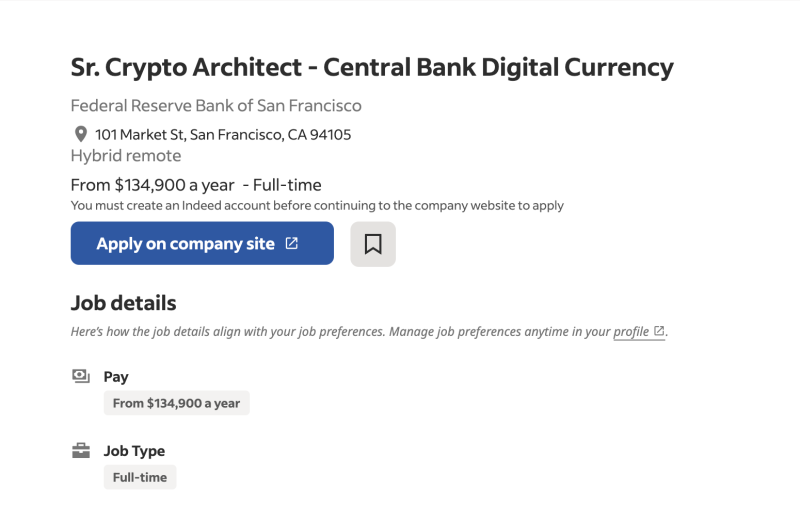San Francisco’s Federal Reserve Bank is seeking a crypto architect for a central bank digital currency (CBDC).

San Francisco’s Federal Reserve Bank is seeking a crypto architect for a central bank digital currency (CBDC) project, reveals an Indeed job posting. According to the role description, the employee will work on CBDC research and development.
The position is full-time and hybrid, with an annual salary starting at $134,900, requiring candidates to have “knowledge of distributed systems implementation, cryptographic protocols such as hashing, public-private keypairs and signing, consensus algorithms, and security.”
“Given the dollar’s significant role, the FRS seeks to further understand the cost and benefits of the potential technologies for CBDC and this emerging field,” reads the posting. According to the Federal Reserve System Careers page, the position has been open for more than 30 days.
“We are looking for a Lead Application Developer to implement example systems related to a CBDC. You will engage directly with management, other developers on the team, development operations teams, and vendors to ensure the Federal Reserve is well-positioned to design, develop, and implement technology to support a CBDC as may be required by the Board of Governors.”

A team of crypto developers has been forming at the San Francisco’s Fed at least since February, when it was looking for a software engineer to help develop and implement systems related to a CBDC initiative.
The recruitment efforts contradict the public stance of the Federal Reserve Board of Governors on CBDCs. On July 19, the central bank said on Twitter that it had not yet decided whether to issue a CBDC and “would only proceed with the issuance of a CBDC with an authorizing law.”
The possibility of a digital version of the U.S. dollar has stirred controversy in the country, promising to be a key talking point in the upcoming presidential election. Many opponents of CBDC argue that it threatens citizens’ privacy and could lead to governmental control, while supporters see it as a global application of blockchain technology.
In a recent event, presidential candidate and Florida Governor Ron DeSantis vowed to ban CBDCs in the United States if elected president. “If I am the president, on day one, we will nix central bank digital currency. Done. Dead. Not happening in this country,” he said during the Family Leadership Summit in Iowa.

